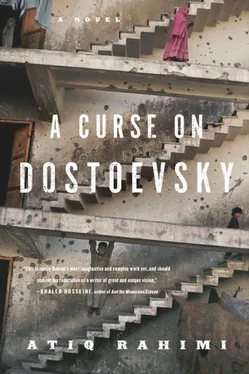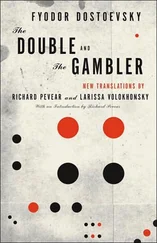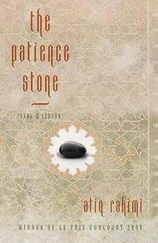* * *
Rassoul sits down. His cell has been invaded by the smell of food. Repellent. He picks up the tray and carries it out. At the end of the corridor, a weak light ruptures the darkness, drawing Rassoul to a half-open door. He finds the young guard smoking a joint. Rassoul hands over the tray and the guard thanks him, and offers him a drag. “I’ve been here eight months. You are my first and only prisoner. Didn’t you have anything better to do than hand yourself in, and create work for us? What did you do?” he asks, stuffing some bread into his mouth.
“I killed someone.”
“Your father?”
“No.”
“Your mother?”
“No.”
“Your brother?”
“No.”
“Your sister?”
“No. No one in my family. I just killed an old woman.”
“In vengeance?”
“I don’t know.”
They fall silent, sleepy, staring blankly at the wreaths of smoke flowing up from the burnt wings of an owlet moth, come to honor the lantern’s flame.
ARAY of light shines through the window, illuminating a section of damp, crumbling wall covered in prisoners’ graffiti. A philosopher has scribbled “Everything passes in the end”; someone who must have been in love: “Love is not a sin,” and finally, a poet:
I myself am stupefied
And by dreams occupied,
The world entire is deep in slumber,
I, impotent to speak; they, incompetent to hear.
Rassoul knows the graffitti off by heart. He has already heard it, already read it. But it is the poem that intrigues him most. Who wrote it originally, and then on this wall? When? And for whom?
For me.
He walks up to the wall and runs his hand over the writing. But the sound of footsteps striding up the corridor freezes his fingers on the letters. Someone opens the door and several armed men burst into his cell, their faces hidden in the gloom. Rassoul huddles into himself, before glancing up at the sound of a familiar voice.
“And how is our watandar ?” It is Parwaiz, accompanied by the clerk and two other men. Rassoul leaps to his feet: “Salam!” Parwaiz is surprised: “Well, now! You’ve got your voice back?”
“Yes, two days ago.”
“Then you can tell me the whole story, at last. I want to hear it all, in your own words.”
“I went to hand myself over to the law.”
“So the court clerk told me,” says Parwaiz. Rassoul continues: “The night I was first brought to your office, I had just committed a murder.”
The commandant leaves the cell, motioning Rassoul to follow him. “There is no such thing as coincidence! Why did you kill?”
“Why? I don’t know.”
Parwaiz stops and stares at him: “Like all of us!”
“That may be. But…” He stops. The clerk takes his chance to interrupt: “Commandant sahib, he killed to save his fiancée.”
“What did your fiancée do?” Parwaiz asks Rassoul, who finds himself unable to speak. He is ashamed, and his silence speaks louder than words.
“Nana Alia wanted to train her up…”
“Yes.”
“You did right, then,” says Parwaiz with a conviction that stuns Rassoul and provokes a laugh from the clerk behind him. Rassoul stops walking; he thinks I did right? Parwaiz is not taking me seriously, either—and he is Head of Security, a mujahideen, a man of the law. He says: “What do you mean, I did right? It was murder, premeditated murder…” Faced with the commandant’s silence, he falls silent again.
They enter the building that houses the Law Archives. The clerk leaves them at the door to a large furnished room, nodding at Rassoul as if to say not goodbye but You idiot!
Parwaiz drops into a battered old sofa and invites Rassoul to sit down opposite him. He continues, as if he had never stopped speaking: “In your position I would have done exactly the same thing.”
“But what was the point—I wasn’t able to change anything, for my fiancée or myself. It did no one any good. It has caused more suffering than good.”
“To do good, one must first suffer…”
“Worse still, my life has become hellish. I’ve lost both my fiancée and the money… A murder for nothing… Even the body has disappeared. Everyone just thinks Nana Alia went to the countryside. Tell me, could any crime be more absurd?”
“First, tell me why you didn’t see your crime through to its proper conclusion?”
“That’s exactly what I’ve been asking myself. Perhaps because I wasn’t able to…”
“Or because you didn’t want to. Because you are not a thief. You are a good man.”
“But it was also Dostoevsky’s fault.”
“Dostoevsky? What has your beloved author done now?”
“He stopped me from carrying the act to its conclusion.”
“How so?”
“The moment I lifted the ax to bring it down on the old woman’s head the thought of Crime and Punishment flashed into my mind. I was struck to the very core… Dostoevsky, yes, it’s him! He stopped me from following in Raskolnikov’s footsteps, becoming prey to my remorse, sinking into the abyss of guilt, and ending up in prison…”
“But where are you now?”
Rassoul lowers his head and mutters: “I don’t know… nowhere.”
“Rassoul- djan , you read too much. That’s fine. But there’s one thing you should know: your fate is written in one book and one book only: the Lawh Mahfuz , the ‘Preserved Tablet,’ written by…” he points up at the ceiling, where a few flies are buzzing around. “Other books cannot change anything, in the world or in a person’s life. Listen: Was Dostoevsky able to change anything in his country? Was he able to influence Stalin, for instance?”
“No. But if he hadn’t written that book he might have murdered someone himself. And he gave me this conscience, this ability to judge myself, and to judge Stalin. That in itself is huge, don’t you think?”
“Yes, it is huge,” agrees Parwaiz, before retreating into a long silence. Then he says: “That is why I congratulate you on your conscience and your act!” He smiles. “You managed to wipe out a loathsome element of our society. The death of this woman must have been a great relief to many people. In fact, that explains the disappearance of her body—it was probably her own family. And if you hadn’t murdered her, someone else would have; Allah would have; a rocket would’ve fallen on her… who knows! So you must see that you have helped several people…”
“And what about me?”
“What about you?”
“What good has it done me?”
“You must see that you have done something important: you have restored justice.”
“Justice! But what justice? Who I am to decide if someone lives or dies? To kill is a crime, the most horrible crime a human being can commit.”
“ Watandar , murder is a crime when the victim is innocent. This woman needed to be punished. She had done wrong to your family, your namouss . She had dishonored you. What you did is called vengeance. No one has the right to judge you as a murderer. The end.”
“Commandant, my problem is not with how others judge me; my problem is with myself. This suffering which gnaws away at me from the inside, like a wound, a festering wound that will not heal.”
“In that case, there are only two solutions: either you amputate the injured limb, or you grow accustomed to the pain.” He takes off his pakol , turns his head, and points to the back of his skull. “Look at that.”
Rassoul bends forward to look.
“Touch it.”
Rassoul brings his hand up, nervously; his fingers brush the commandant’s skull. “Can you feel anything?” Rassoul hesitates to reply, then suddenly pulls away his hand.
Читать дальше












